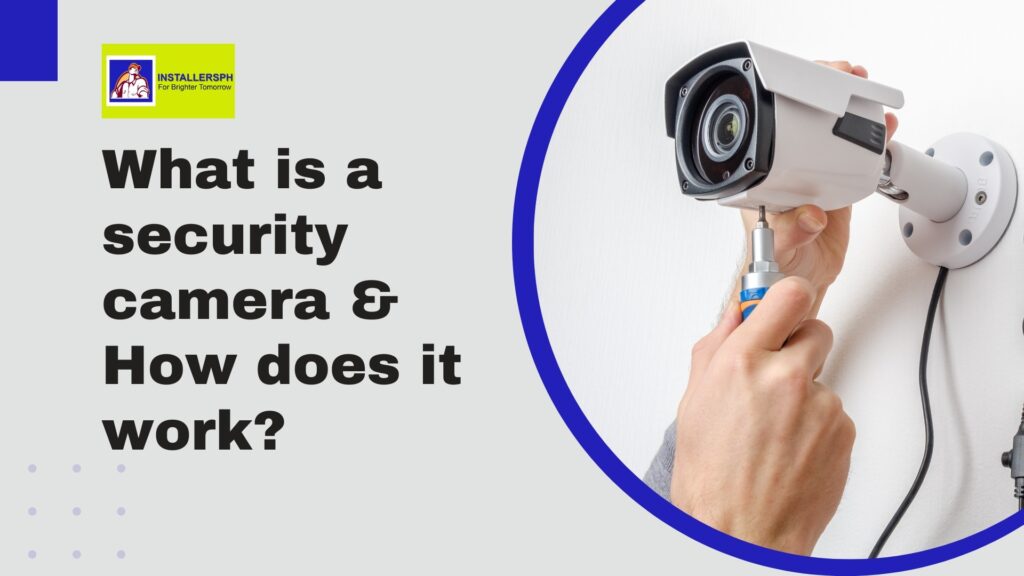CAT 6 Specs Overview. Introduction. In today’s fast-paced digital world, reliable network connectivity is no longer a luxury; it is a fundamental requirement for businesses, educational institutions, and homes. From seamless video …
What is a security camera & How does it work?

A CCTV camera (or Closed-Circuit Television camera) is a type of security system that uses cameras to transmit a signal to a specific place, usually on a limited set of monitors. The cameras are linked to a recording device or network, and the footage is used for surveillance purposes. CCTV cameras are widely used in both residential and commercial environments to help protect people, property, and valuables.
The most common type of CCTV cameras are bullet cameras, which are small and cylindrical in shape. They are typically mounted on the wall or ceiling, and they have a wide-angle lens that allows them to capture images from a large area. The cameras can be set to record in various resolutions, depending on the size and type of the camera.
The cameras are connected to a recording device, such as a digital video recorder (DVR), or an IP network. The footage is then stored on the device or network, which can be accessed remotely by a monitoring station or other authorized personnel.
Different types of CCTV cameras are available to suit different security requirements. For example, box cameras are larger and more visible, making them ideal for outdoor surveillance. Dome cameras are smaller and less conspicuous, and they are better suited for indoor use. Network IP cameras are even smaller and allow for remote viewing and recording over the internet.
In addition to providing security, CCTV cameras can also be used for other purposes such as monitoring traffic and providing evidence in case of a crime. CCTV cameras are a great asset for any business or home security system. They are relatively inexpensive and easy to install, and they provide peace of mind knowing that your property is being monitored and protected.
How does it work?
Closed-circuit television (CCTV) cameras are a popular choice for businesses and homeowners looking to increase security. These security cameras provide an extra layer of protection, allowing you to monitor activity in and around your home or business. But how do CCTV cameras work?
The Basics of CCTV Cameras
At the most basic level, CCTV cameras are installed to record and transmit footage back to a monitoring station. The cameras are typically connected to a digital video recorder (DVR) or network video recorder (NVR). The DVR or NVR stores the footage, which can then be accessed remotely.
The cameras themselves come in a variety of shapes, sizes, and types. There are infrared (IR) cameras, pan-tilt-zoom (PTZ) cameras, and bullet cameras, among many others. Depending on the camera type, they can be used both indoors and outdoors. The footage captured by CCTV cameras can be viewed in real-time or recorded for later viewing.
CCTV Cameras and Network Connectivity
When it comes to CCTV cameras, the most important part is how they are connected to the network. Depending on the type of camera, the connection can be either wired or wireless. Wired connections typically use coaxial cables or Ethernet cables. These connections are more reliable and secure than wireless connections. Wireless connections use Wi-Fi technology to connect the camera to the network. This allows the camera to be installed virtually anywhere, as long as there is a Wi-Fi signal available.
CCTV Cameras and Security Systems
Many CCTV cameras now come with advanced security features. These features allow you to set up motion detection alerts, schedule recordings, and even set up facial recognition. Motion detection alerts can alert you to any activity in the monitored area, while facial recognition can help identify people who enter the premises.
The footage captured by CCTV cameras can also be used to deter potential criminals. Having a visible presence of CCTV cameras can act as a deterrent to potential intruders. The footage can also be used to identify suspects in the event of a crime.
Conclusion
CCTV cameras provide an extra layer of security for businesses and homeowners. They allow you to monitor activity in and around your home or business. The cameras are typically connected to a digital video recorder (DVR) or network video recorder (NVR) and come in a variety of shapes, sizes, and types. Wired or wireless connections can be used to connect the camera to the network, and many cameras now come with advanced security features. The footage captured by CCTV cameras can be used to deter criminals and identify suspects in the event of a crime.
Related Articles
Celebrating a Year of Growth and Success at InstallersPH IT Solutions. Introduction. As the year comes to a close, InstallersPH IT Solutions takes a moment to reflect on a journey defined by …
Notice to the Public: Holiday Vacation Advisory of InstallersPH IT Solutions. Introduction. InstallersPH IT Solutions is committed to providing reliable and professional IT services to all our valued clients and partners. As …


